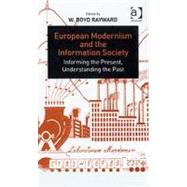European Modernism and the Information Society: Informing the Present, Understanding the Past
, by Rayward,W. Boyd- ISBN: 9780754649281 | 0754649288
- Cover: Hardcover
- Copyright: 3/18/2016
These essays illuminate a little-known yet fascinating world of documentalists, librarians, scientists, communications experts, and utopian dreamers, who pioneered a new understanding of information integral to European modernism. With its rich historical perspective, this book offers a powerful corrective to the idea that the information society is a recent phenomenon. Kathy Peiss, University of Pennsylvania, USA This volume presents the ideas of early Twentieth Century European thinkers about how best to create, disseminate and manage publicly available information. In doing so it provides a novel historical context for assessing widely held assumptions about today''s globalized, post modern information society. The contributors to this volume present the ideas of early Twentieth Century European thinkers about how best to create, disseminate and manage publicly available information. Interdisciplinary in perspective, the volume reflects the nature of the thinkers discussed, including: Otto Neurath, Patrick Geddes, the English Fabians, Paul Otlet, Wilhelm Ostwald and H. G. Wells. It also charts the interest since the latter part of the nineteenth century in finding new ways to think about and to devise systems and technologies to manage the growing body of available information in such a way that Western civilization might be advanced; social misery and inequalities across classes and nations alleviated; economic prosperity promoted; and to the cause of peaceful coexistence among nations advanced. In doing so the contributors provide a novel historical context for assessing widely held assumptions about today''s globalized, ''post modern'' information society. This volume will be of interest to sociologists, cultural studies scholars, historians of architecture, urban planning, science and technology studies and to library and information scientists as well as to all who are curious about the complex context of what has been called today''s information revolution and the creation of a modern networked information society. Contents: Introduction: European modernism and the information society: conceptual interdependence, W. Boyd Rayward; Understanding the information domain: the uneasy relations between sociology and cultural studies and the peculiar absence of history, Frank Webster; On the cultural and intellectual context of European documentation in the early 20th century, Michael Buckland; A tale of 2 narratives: prolegomena to an alternative history of library and information science, Steve Fuller; The role of facts in Paul Otlet''s modernist project of documentation, Bernd Frohmann; Ferdinand vander Haeghen''s shadow on Otlet: European resistance to the Americanized modernism of the Office International de Bibliographie, Pieter Uyttenhove and Sylvia van Peteghem; Towers and globes: architectural and epistemological differences between Patrick Geddes''s outlook towers and Paul Otlet''s mundaneums, Pierre Chabard; Building society, constructing knowledge, weaving the web: Otlet''s visualizations of a global information society and his concept of a universal civilization, Charles van den Heuvel; Networking knowledge before the information society: the Manchester Central Library (1934) and the metaphysical-professional philosophy of L.S. Jast, Alistair Black; Documentation and Utopia: Fabian anticipations of the information society, Alistair S. Duff; Public science in Britain and the origins of documentation and information science, 1890-1950, Dave Muddiman; The march of the modern and the reconstitution of the world''s knowledge apparatus: H.G. Wells, encylopedism and the world brain, W. Boyd Rayward; The modern museum in the age of its mechanical reproducibility: Otto Neurath and the Museum of Society and Economy in Vienna, Nader Vossoughian; Gesellschaft und Wirtschaft: an encyclopedia in Otto Neurath''s pictorial statistics from 1930, Sybilla Nikolow; Visualizing social facts: Otto Neurath''s ISOTYPE project, Frank Hartmann; Paper







